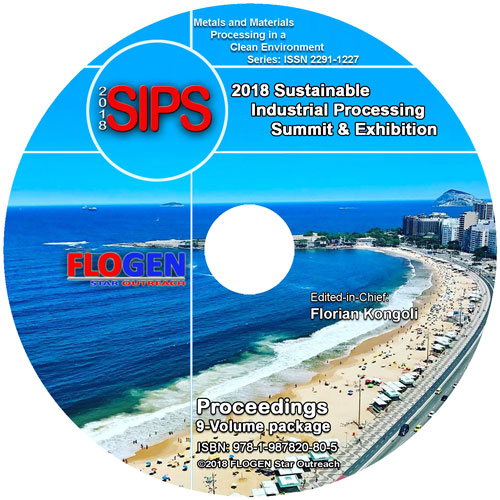2018-Sustainable Industrial Processing Summit
SIPS2018
Volume 6. New and Advanced Materials and Technologies
| Editors: | F. Kongoli, F. Marquis, P. Chen, T. Prikhna, N. Chikhradze |
| Publisher: | Flogen Star OUTREACH |
| Publication date: | 23 December 2018 |
| Pages: | 392 pages |
| ISBN: | 978-1-987820-92-8 |
| ISSN: | 2291-1227 (Metals and Materials Processing in a Clean Environment Series) |

CD shopping page
Colloid-based Drug Delivery Systems
Maria A. G. Soler1;1UNIVERSIDADE DE BRASILIA, Brasilia, Brazil;
Type of Paper: Regular
Id Paper: 272
Topic: 43
Abstract:
Drug delivery systems (DDS) based on colloidal structures have become an emerging field of interest in the past few decades, owing to their outstanding ability in transporting and delivering drugs, protecting the drug against degradation, and preventing adverse side effects of toxic drugs. Further, these colloid-based DDS can provide contrast agents for early diagnoses, delay the release of their content, and improve therapeutic efficiency of drugs and photosensitizers by enhancing their availability in physiological mediums or by delivering them to specific targets [1,2]. This talk will summarize new achievements in the field of colloid-based DDS. In particular, we will present our recent results on the production of iron oxide-based drug delivery systems. More specifically, the talk will focus on production and structural features of iron oxide nanoparticles [3] functionalized with chondroitin sulphate, and glucosamine hydrochloride. Chondroitin sulphate and glucosamine hydrochloride are recognized for their therapeutic action against osteoarthritis. To produce colloidal dispersions at optimized conditions, and investigate the drug incorporation models, UV-vis, Raman, fluorescence, and infrared spectroscopies, as well as dynamic light scattering, X-ray photoelectron spectra, transmission electron microscopy, and magnetic measurements, were performed. Further, the colloidal stability of the dispersions was studied in phsyiological media, as well its cytotoxicity effects via the MTT assay. Colloidal suspensions comprising chondroitin or glucosamine coating magnetite nanoparticles presented good stability and no toxicity, and are thus promising nanocarriers for site specific delivery of chondroitin sulfate and/or glucosamine.